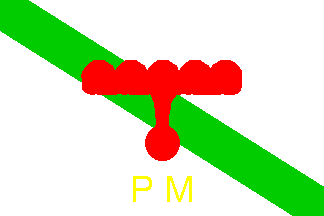![[Roundel of Katanga]](../images/c/cd^katrn.gif) image
by Frank George Valoczy, 02 Jul 2003
image
by Frank George Valoczy, 02 Jul 2003 
Last modified: 2005-12-31 by bruce berry
Keywords: roundel |
Links: FOTW homepage |
search |
disclaimer and copyright |
write us |
mirrors
![[Roundel of Katanga]](../images/c/cd^katrn.gif) image
by Frank George Valoczy, 02 Jul 2003
image
by Frank George Valoczy, 02 Jul 2003
We have the roundel with review from [cos98]. There is a plate at this
webpage showing the flag as fin flash.
See also this
site and article from "Insignia".
Dov Gutterman, 15 Jun 2004
 image
by i>Ivan Sache, 08 Oct 1997
image
by i>Ivan Sache, 08 Oct 1997
Description: White field with a light green stripe from upper
hoist to lower fly, charged with a red disc topped with a red “crest”.
Below the symbol, gold letters "PM".
Occurrence: Flag used during a military parade in the Katanga independent
state.
Source: TV-documentary Rhodes nostalgie. The documentary tells
the story of the Jewish community of the island of Rhodes. Most of them
emigrated to Belgian Congo before World War II
and settled in Katanga. Those who remained in Rhodes died in Auschwitz.
Accuracy: Medium. The flag was very clearly depicted by the TV-documentary
but my rendition of the emblem may be approximate.
Meaning: I don't know. PM could stand for Police Militaire (Military
Police). Who can say more? [see forward]
Comment: During the same documentary, the independent
Kasai flag was also shown during a political meeting.
Ivan Sache, 08 Oct 1997
This flag is effectively a Military Police one (PM is for "Prevote Miltaire",
Miltary Provost). The Symbol is a bomb with fllames (an old- fashioned
grenade, actually). This comes from the Belgian Army, where the MP has
the grenade as corps badge. The Katangese Army ("Gendarmerie Katangaise")
used the same badges and insignia as the former Belgian Congo's Army ("Force
Publique"), except for the officer's rank insignia, where the croisette
replaced a six-pointed star.
Jean-Luc Sohier, 19 February 2001